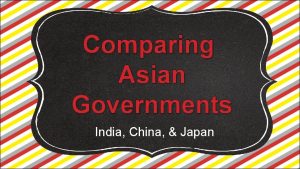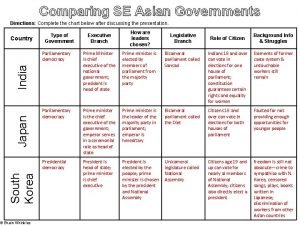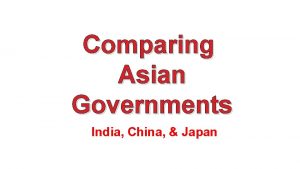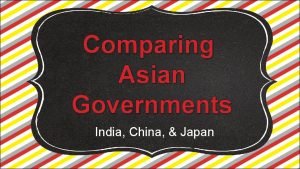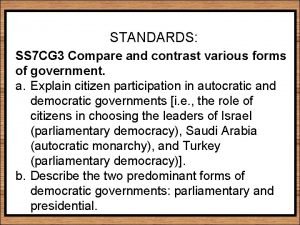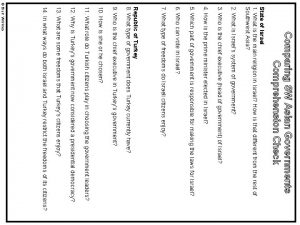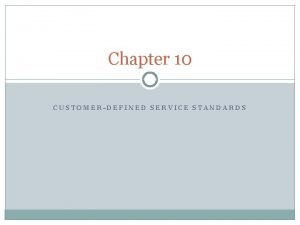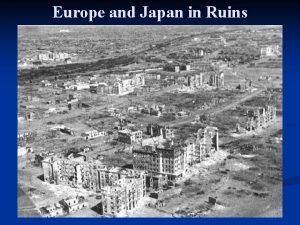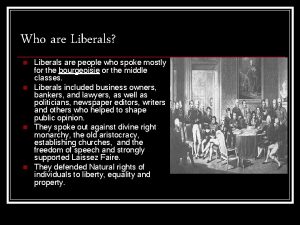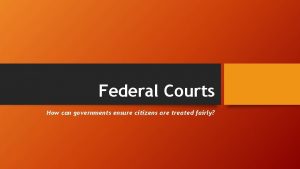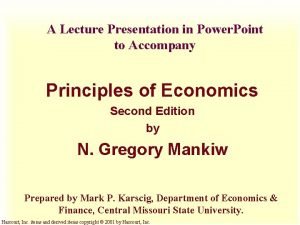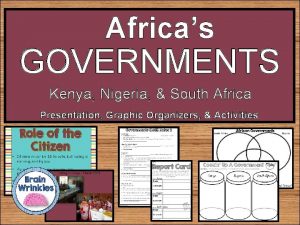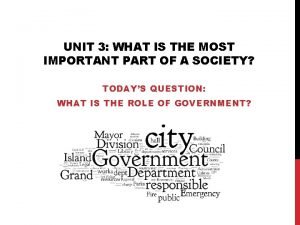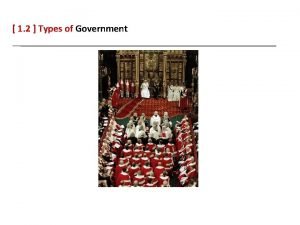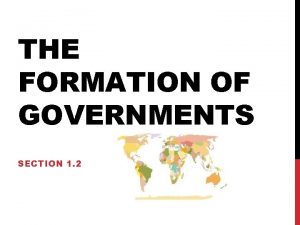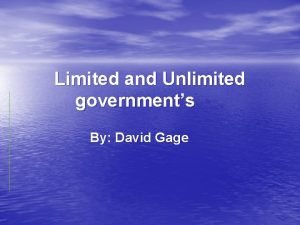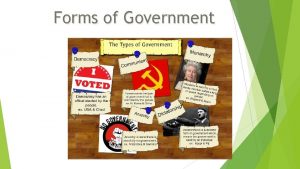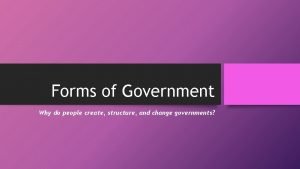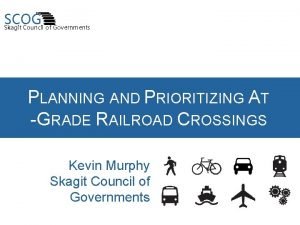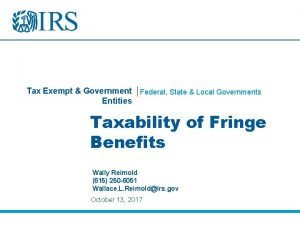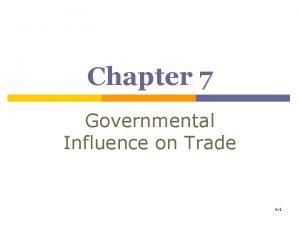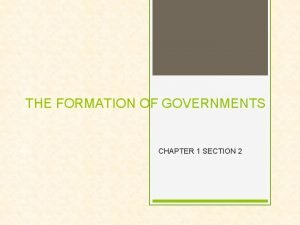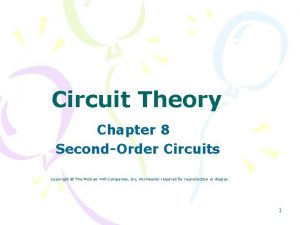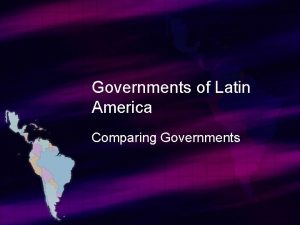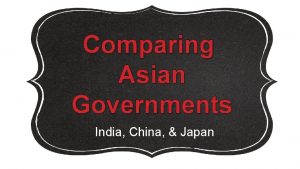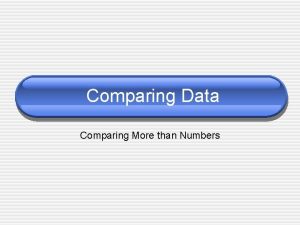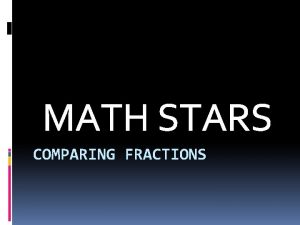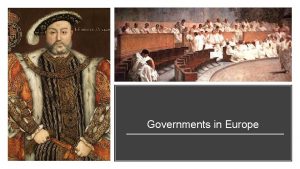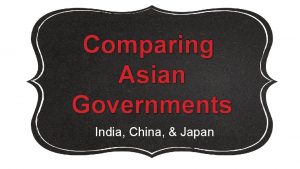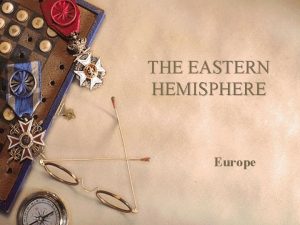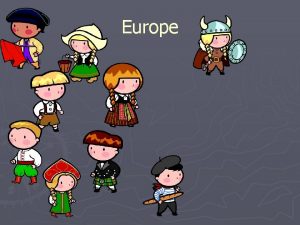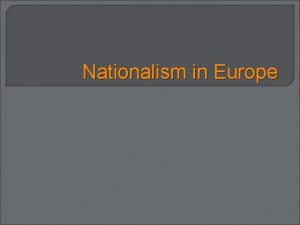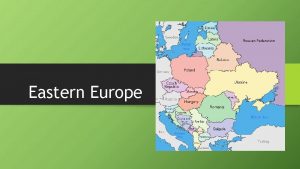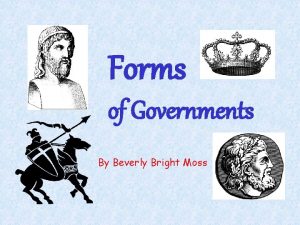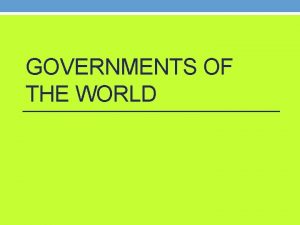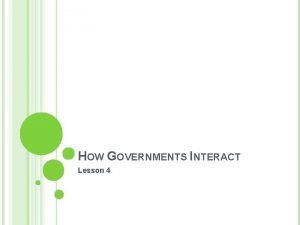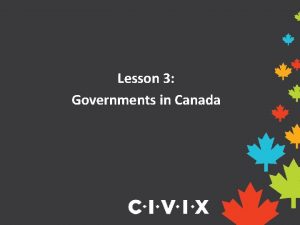Governments of Europe Comparing Governments Standards SS 6






























- Slides: 30

Governments of Europe Comparing Governments

Standards SS 6 CG 3 a – Explain citizen participation in autocratic and democratic governments SS 6 CG 3 b – Describe the two predominant forms of democratic governments: parliamentary and presidential.

Essential Question How do the governments of the United Kingdom, Germany, and Russia compare to that of the United States?

Democracy in Europe • In the past, powerful monarchs ruled in most European countries. • For centuries, kings and queens held power. • Citizens had little to no right to participate in the government.

Democracy in Europe • Today, much has changed. • Most European nations are highly democratic. • In a democracy, the people hold the ultimate power and vote to elect government representatives.

Democracy in Europe • Most European governments are parliamentary democracies, where the legislature (Parliament) holds much power and appoints a prime minister to be the chief executive (also called the head of government).

Democracy in Europe • Parliamentary democracies often have a head of state, too. • This person officially represents the nation but in reality has very little power.

Democracy in Europe • Europe also has several presidential democracies. • These governments divide power between separate executive and legislative branches. • The president, who is elected by the people, is the chief executive, and also acts as the head of state.

Democracy in Europe Chief Executive Head of State • Head of the • A leader who government represents the • A country’s top country at official who has great ceremonial events power and manages and official the day-to-day functions, but who activities of the typically holds very government. little real power.

Quick Review Most countries in Europe are ____ in which _______ holds the ultimate power. autocracy, democracy, government, one ruler, parliamentary, presidential, state, the people

Quick Review Most countries in Europe have a ____ system of democracy. autocracy, democracy, government, one ruler, parliamentary, presidential, state, the people

Quick Review The head of ______ is a ceremonial position with very little real power. autocracy, democracy, government, one ruler, parliamentary, presidential, state, the people

Quick Review The head of ______ is a country’s top official and has considerable power. autocracy, democracy, government, one ruler, parliamentary, presidential, state, the people

Governments: UK & Germany • The United Kingdom and Germany are both highly democratic countries. • Citizens enjoy many rights and freedoms such as the right to vote and freedoms of speech, the press, religion, and assembly.

Governments: UK & Germany • People participate in their governments by running for political office, voting for representatives, and expressing their opinions on important issues. • Germany and the UK share another similarity – they are both parliamentary democracies.

Governments: The UK • In the United Kingdom, citizens age 18 and older vote to elect member of one of two houses of parliament. • The British Parliament then selects a prime minister from the elected legislature.

Governments: The UK • The prime minister is a powerful chief executive. • He or she leads Parliament in making and enforcing laws in the United Kingdom.

Governments: The UK • Before it was a democracy, the UK was a powerful monarchy. • Today, the British monarch (king or queen) still reigns but has very little power. • Instead, he or she is the ceremonial head of state.

Governments: Germany • In Germany, citizens age 18 and older vote to elect members of one of the two houses of parliament. • The German Parliament then selects a chancellor from the elected legislature.

Governments: Germany • The chancellor is the powerful chief executive. • He or she leads the parliament (the Bundestag) in making and enforcing laws in Germany.

Governments: Germany • Germany has a president, but it is not a presidential democracy! • The German president is appointed by a special committee. • He or she is the head of state and has very little power.

Governments: Russia • Like the UK and Germany, Russia is democratic. • Russia’s Constitution promises the citizens the right to vote as well as freedoms of speech and the press, religion, and assembly. • However, the Russian government is often accused of violating citizens’ freedoms of speech and press.

Governments: Russia • The government uses its power to influence the country’s media. • Citizens who criticize the government may face consequences, including time in jail. • Russia is different in another way, too – it is a presidential democracy.

Governments: Russia • In Russia’s presidential system, the executive branch (president) and legislative branch (Federal Assembly) are separate. • Russia’s Federal Assembly has two houses.

Governments: Russia • Citizens vote to elect representatives to the State Duma, while members of the Federation Council are appointed by Russia’s many lower district governments.

Governments: Russia • Citizens also elect Russia’s president, who is the head of state. • Unlike most European heads of state, Russia’s president holds considerable executive power. • He or she appoints many government officials, including the prime minister, which is the chief executive.

Governments: Russia • The president can also issue orders and decrees without approval of the legislature.

Quick Review – True or False 1. Citizens play an important role in the democracies of the UK, Germany and Russia. 2. Voting is one key way citizens can participate in a democratic government. 3. Germany top official is its president while UK’s top official is its king or queen.

Quick Review – True or False 4. Russia’s president is appoint by the country’s legislature, the Federal Assembly. 5. In all three countries, citizens elect member to one house of the bicameral legislature. 6. In a parliamentary democracy, the head of government is part of the legislative branch.

Bibliography • • © Carole Marsh/Gallopade International http: //www. georgiaexperience. com ISBN 978 -0 -635 -12575 -0 Student Workbook Pages 64 -66
 Comparing asian governments
Comparing asian governments Comparing sw asian governments answer key
Comparing sw asian governments answer key Comparing african governments
Comparing african governments Is japan a unitary state
Is japan a unitary state Comparing sw asian governments
Comparing sw asian governments Comparing asian governments
Comparing asian governments Comparing sw asian governments
Comparing sw asian governments Comparing sw asian governments comprehension check
Comparing sw asian governments comprehension check Hard standards and soft standards examples
Hard standards and soft standards examples Note three provisions in japan’s new constitution.
Note three provisions in japan’s new constitution. Liberals wanted governments to be based on
Liberals wanted governments to be based on How can governments ensure citizens are treated fairly
How can governments ensure citizens are treated fairly Governments can sometimes improve market outcomes examples
Governments can sometimes improve market outcomes examples Centre region council of governments
Centre region council of governments Se asia's governments comprehension check
Se asia's governments comprehension check How do the governments of kenya and nigeria compare?
How do the governments of kenya and nigeria compare? Different kind of governments
Different kind of governments What are the three ways to classify governments
What are the three ways to classify governments The formation of governments 1-2
The formation of governments 1-2 Is canada a limited or unlimited government
Is canada a limited or unlimited government How are governments classified
How are governments classified Why do people create
Why do people create Skagit council of governments
Skagit council of governments Are city governments tax exempt
Are city governments tax exempt Are local governments tax exempt
Are local governments tax exempt Essential industry argument
Essential industry argument The formation of governments 1-2
The formation of governments 1-2 Lesson 8: comparing series and parallel rlc circuits
Lesson 8: comparing series and parallel rlc circuits Comparing and classifying
Comparing and classifying Comparing informational texts
Comparing informational texts Compare and contrast hinduism and buddhism
Compare and contrast hinduism and buddhism
